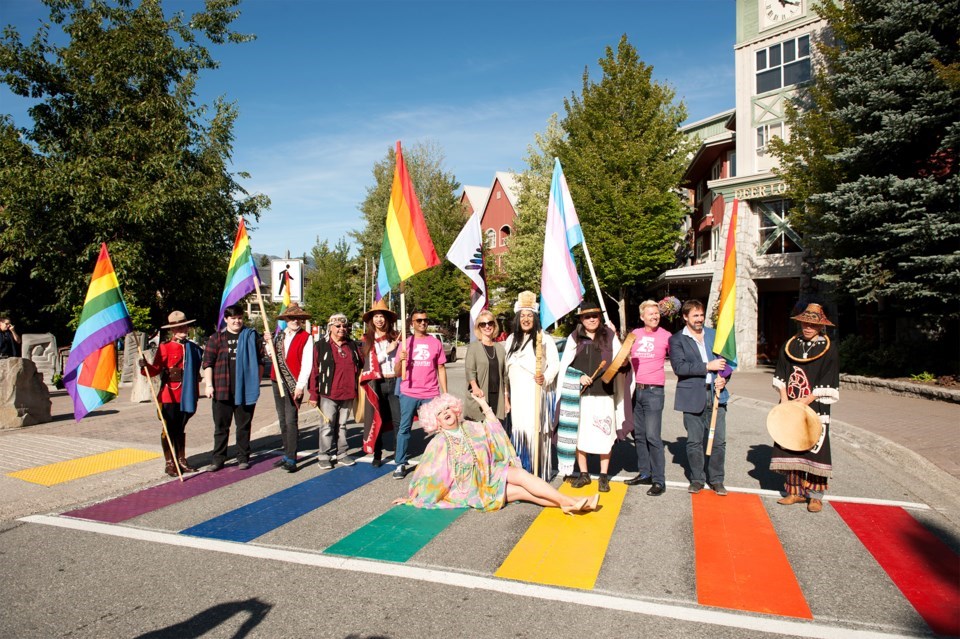Canada, all of its provinces and territories and, of course, Whistler are going through a significant period of awakening.
Pique’s pages have been covering the news and offering opinions about many of the issues behind the journey we are on.
Here’s another piece: June is celebrated as Pride month globally, and we have seen the many online and some in-person events that have been happening from New York to Warsaw to Guadalajara to Toronto.
You could be forgiven for not knowing it was Pride month in Whistler, that’s true. While we are one of the most LGBTQ+ friendly tourist destinations (and I hope communities) we had little on tap for Pride month.
I’m chalking this up to our ever-present companion COVID-19 which, until June 15, basically had all travel set at essential, though hopefully as you read this we will be getting ready for travel and life to be opened up more by our public health officials.
Pride month commemorates the 1969 Stonewall Uprising in New York City, a seminal moment in the fight for equal rights for LGBTQ+ people. The rainbow flag was created a decade later as a symbol of the community’s pride. It is flown by others, and displayed in shops, accommodation and other places as a symbol of support.
But while Pride month in Whistler may have been very low key in 2021, the idea behind Pride is something we have been embracing for decades—and like many things, we love to celebrate it in winter and ski season.
Every year since 1992 Whistler has hosted a LGBTQ+ ski week festival. Always somewhat irreverent and with a reputation as a fun-filled, adventurous event, it matches the resort’s own vibe. Of course it has changed a great deal since the first one hosted under the name Altitude, but its relevance and the opportunity it offers to embrace and learn about diversity is as important to Whistler today, maybe even more so, as it was then.
(ICYMI—Altitude was created in response to a controversial amendment to Colorado’s state constitution that prohibited cities and institutions from establishing anti-discrimination protections for sexual orientation. Known as Amendment 2, it was eventually declared unconstitutional by the U.S. Supreme Court.)
The Whistler Pride and Ski Festival’s visibility expanded in 2010, Whistler’s Olympic year, with the resort’s first gay pride parade, sandwiched between the Olympics and Paralympics, as well as the establishment of Pride House, a safe space for LGBTQ+ athletes and media that was the first of its kind for the Games.
“We thought by creating Pride House, we could create the conversation. We knew that if there was enough awareness of homophobia within sport, then we could start advocating at senior levels within sport to start making their sporting environments safer for their athletes,” Dean Nelson, the festival’s former director, told Pique in March.
“This is the legacy we gifted to the world, and it continues to this day. It’s pretty remarkable.”
While the festival had to be cancelled in 2021, the plan is to return to celebrate its 30th year in 2022 (Get your tickets early!).
This is not to say that life is sunshine and rainbows for the LGBTQ+ community in Canada—it is not. While the Charter of Rights and Freedoms has brought legal recognition to many areas of life it would be naïve to think that all the hearts of Canadians are won.
I think sometimes about Martin Luther King, Jr. when he said, “It may be true that the law cannot change the heart, but it can restrain the heartless.”
Just last week we finally saw Bill C-6 pass third reading in the House of Commons, basically outlawing conversion practice. This is a therapy that aims to change an individual’s sexual orientation to heterosexual through talking or prayer. Members from most parties unanimously supported the bill in a vote of 263-63, though 62 of the 63 “against” votes were from Conservative MPs.
There is still much work to be done to support the LGBTQ+ community worldwide and here at home—youth from families who do not accept their identities are more likely to attempt suicide than those from accepting families and they are four times more likely to commit suicide than heterosexual youth.
And in more than two dozen countries LGBTQ+ organizations are illegal, while in eight countries people can be executed for being gay or lesbian and in 45 countries women can be imprisoned for being lesbian.
This journey, too, must continue.




